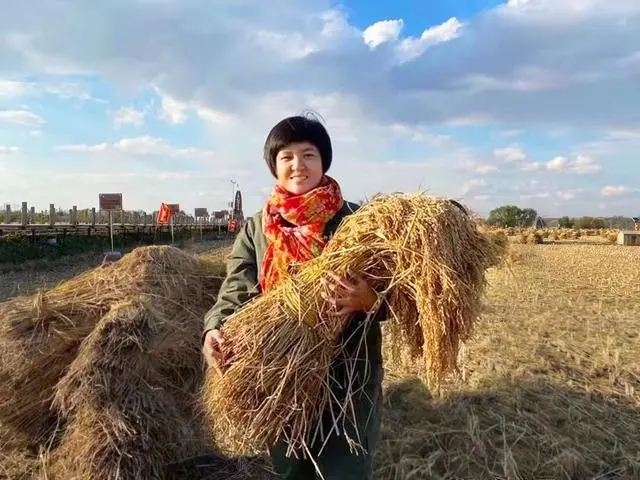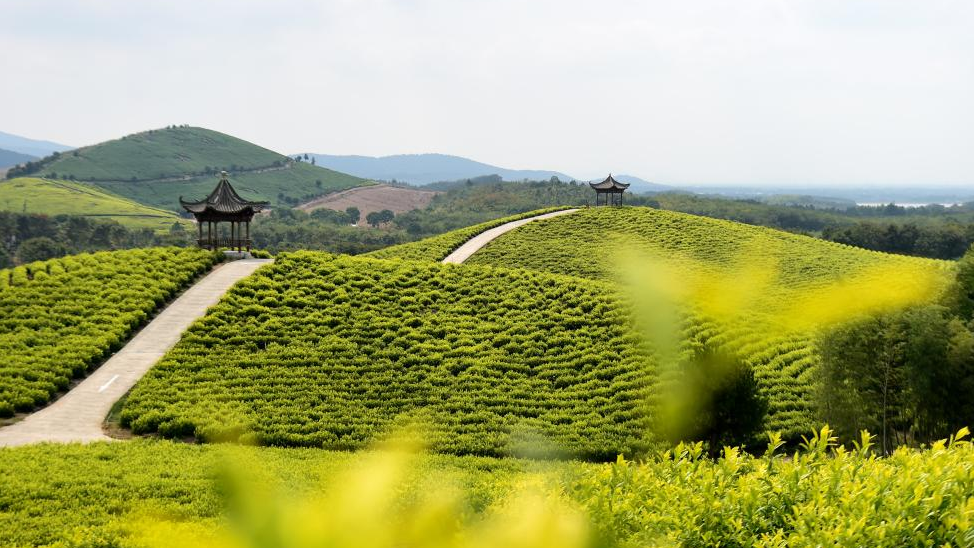Young woman in NE China's Heilongjiang uses Internet to bring wealth to villagers
Chen Yujia, a woman born in 1989 in a village in northeast China's Heilongjiang Province, has leveraged the power of the Internet to improve the production, processing and sales of rice and promote the integrated development of agriculture and tourism in the village, bringing prosperity to locals.

Photo shows Chen Yujia. (Photo provided by the interviewee)
Thanks to its unique natural ecology, Shangguandi village in Bohai township, Ning'an city, Heilongjiang has been blessed with delicious rice that has high nutritional value. However, this rice was previously little known to the outside world, and suffered a lack of sales channels as a result.
In 2016, Chen returned to her hometown and decided to help her fellow villagers sell the rice online.
“In the past, villagers waited for retailers to purchase their rice and couldn't get a good price," said Chen, who became the sales manager of a rice cooperative in the village.
In less than a month, Chen received her first order after posting an advertisement on her WeChat account. Chen's acquaintances bought rice from her and introduced the product to more people. "I sold hundreds of kilograms of rice," Chen said.
After enjoying initial success, Chen set up an online marketing team and opened an online store, showing the entire planting process of the rice to consumers by shooting videos and holding live-streaming sessions. Gradually, she accumulated a large number of fans and received more and more orders online.

Farmers harvest rice in Shangguandi village in 2021. (Photo provided by the interviewee)
Meanwhile, the cooperative has taken measures to improve the quality of its rice, including using organic fertilizers, manually removing weeds and introducing the rice-duck farming mode.
In addition to advertising rice in her videos and live-streaming sessions, Chen has also told stories of how villagers plant rice, showcased the beauty of rural life, and enhanced interaction with netizens.
In addition, Chen has launched a "farmland adoption" program, which allows a consumer to "adopt" 1 mu (about 0.07 hectares) of rice field in the village. After the harvest, the "adopter" will purchase the rice from the fields. The "adopter" can also experience farming activities such as transplanting rice seedlings and harvesting rice free of charge on the "adopted" fields.
"The program has gained great popularity since its launch," said Chen, adding that this year's 200 mu of paddy fields had been "adopted" at a price of nearly 4 million yuan (about $558,854) before transplanting rice seedlings.

Photo shows a view of Shangguandi village. (Xinhua/Dong Baosen)
Chen uses a personalized sales approach in her work. "After the harvest, we store unhusked rice at granaries with a constant humidity and temperature in our village and mill rice according to consumers' orders at any time to deliver the milled rice to them as soon as possible," she said.
"We have also utilized an agricultural Internet of Things (IoT), which enables consumers to get clear information on the entire production process of our rice by scanning a QR code," Chen explained, adding that the integrated model of both online and offline sales channels boosts customer loyalty. According to her, the cooperative's online sales volume accounts for nearly one-third of its total.
While selling rice online, Chen has also devoted herself to helping Shangguandi village develop rural tourism, as it is close to two beautiful lakes and a national forest park and boasts picturesque scenery.
"We promoted the development of rural tourism based on our rice farming culture and built different functional zones including a sightseeing area, a farming experience area, a food street, and a vegetable and fruit-picking area, attracting large numbers of tourists," said Zhang Benjun, first Party secretary of the village.
Chen also makes videos of the lakes and paddy fields, as well as interesting activities including catching fish and ducks in the paddy fields, which draws many netizens to the village.
Chen explained that the village is a popular photo spot even during the slack farming season, as visitors like to go skiing and enjoy snow sculptures and local delicacies in the village.
As more and more visitors come to the village, Chen has helped its residents turn their old houses into homestay hotels, which increases not only the village's tourism revenue, but also house-owners' incomes. So far, the village has 19 homestay hotels, which can jointly accommodate over 100 tourists at the same time.
Statistics showed that the collective income of Shangguandi village exceeded 1.1 million yuan and the per capita net income of villagers surpassed 27,000 yuan last year.
Jin Liyu, deputy head of Ning'an city's employment bureau, said over 300 college graduates like Chen have returned to their hometowns to start their own businesses, injecting new impetus into rural revitalization.
Photos
Related Stories
- Space station rice tests show promise
- Rice harvested in SW China's Guizhou
- Rice ripens in Yongfeng, Sichuan
- Rice harvested in SE China's Fujian
- Chinese scientists identify genes for more heat-tolerant rice
- Giant rice spike fireworks fired to commemorate Yuan Longping, China's 'father of hybrid rice'
- Children experience rice transplanting in Jiangxi
- Chinese scientists identify yield-related genes in maize, rice
- Seawater rice sees bumper harvest in N China's Tianjin
- Farmers harvest rice in Jurong City, Jiangsu
Copyright © 2022 People's Daily Online. All Rights Reserved.









